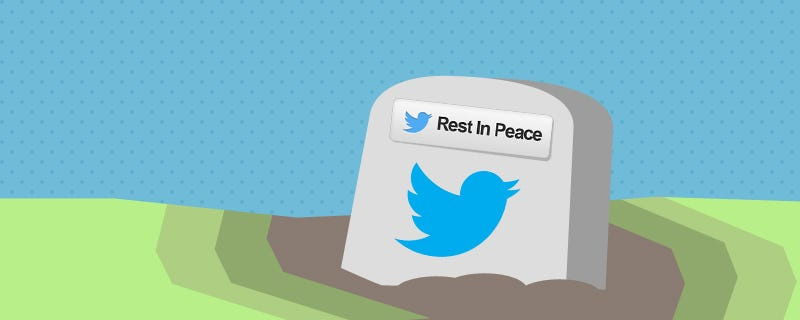I spent over ten years on Twitter. I was committed to challenging bad history from individuals and groups committed to distorting the history of the Civil War era. If I saw a tweet pushing the Black Confederate myth, you can bet that I offered a quick and convincing response. I joined other #twitterstorians committed to highlighting the complexity and nuance of history.
Now after close to two months away from the platform, not only am I questioning the value of the time I spent on twitter, I am also questioning whether it’s good for the discipline of history.
In 2019 historian Waitman W. Beorn outlined the rallying cry that many historians have embraced on Twitter:
Online media sites like Twitter allow scholars to reach thousands of people they may never have reached in an accessible way. Academic engagement on Twitter has been called ‘shallow scholarship,’ but precisely the opposite is true; the very medium requires concision, structure and clarity. We are forced to address historical abuses directly, simply and publicly — not always our strong suit — but the form does not simplify the content or the message, only its delivery. Our history threads are time-consuming to write and research, but they string together multiple tweets in a narrative form that includes references and is easily digestible.
By dismantling bad history, brick by brick, historians online are modeling for readers the kind of critical interaction with sources we so desperately need. We confront black and white polemic with nuance, complexity and historical context while documenting our interpretations: We provide scholarly and primary sources for interested readers to follow.
The road that historians have traveled in an attempt to ‘dismantle bad history’ has been paved with the best of intentions. There are some wonderfully talented historians, passionate about education and public outreach, who are sharing their research through carefully constructed Twitter threads. Curious readers are exposed to a wide range of primary sources and references to the latest scholarship. Many people, including yours truly, have benefited from the presence of historians on Twitter.
But it has come at a price.
Over the course of the Trump presidency and increasingly over the past few years it has become more difficult to distinguish the work that historians have attempted to showcase on Twitter and the toxic political culture that thrives and is encouraged by the platform’s algorithms.
My concern is that as historians have engaged more openly in political disputes online it becomes increasingly difficult to view their scholarship as little more than an extension of their politics. Don’t get me wrong. I am not suggesting that historians should refrain from sharing their political opinions online, but that on a site like Twitter the showcasing of historical knowledge and the sharing of one’s political views look more and more indistinguishable from one another.
Popular historians on Twitter, who attract large followings, inadvertently create pockets of intense loyalty from their followers and are more than happy to follow a tweet to the offending party and pile on. I saw this numerous times with my own tweets, for example, after calling out a problematic Lost Cause claim only to watch scores of people move in for the kill. In many cases I lost any opportunity to follow up with the individual to offer additional guidance.
I also observed the gravitational pull of some of the most popular historians turn their own colleagues—historians whose work I deeply respect—into attack dogs. It’s one thing to ‘dunk on Dinesh D’Souza,’ but I’ve seen plenty of examples of historians pile on colleagues simply for disagreeing with a certain interpretation.
The tipping point for me had nothing to do with Elon Musk’s takeover, but with the realization that I was censoring myself out of fear that I would be the subject of a pile on over a simple disagreement with another historian or high-profile person. It points to how little room there is for sharing ideas and exploring different perspectives.
That’s the Twitter-effect and no one is immune from its influence.
I applaud historians for attempting to share their knowledge and engage the public through social media. When I first started blogging in 2005 I was criticized by many of my academic friends, who were convinced that social media was a waste of time. It’s nice to see that things have changed, but I am more and more convinced that Twitter has made it more difficult to showcase what it is that historians do.
Looking back at my time on Twitter I am also not all all convinced that my efforts had much of any impact. Tweets enjoy a short half-life—a few may even go viral—but beyond that they quickly fly off into the dark never to be seen again. The ability to archive and organize tweets has always been lacking—a problem that I am surprised historians didn’t see as a serious problem.
While historians continue to do good work on Twitter, it’s hard to see much value in the platform given that its new owner is committed to promoting fake news and misinformation. The site was never built with highlighting expertise in a given field beyond the short-lived verification program, which has been discontinued.
As much as it pains me to say it, the bird is dead, though I am now unsure of whether it ever really got off the ground.






I don't think you wasted your time on Twitter. I, for one, probably would not have found your work and being exposed to your scholarship has broadened my own perspectives on certain aspects of the Civil War.
I do think twitter is a useful space for historians to engage in addressing "bad history." Somebody has to do that somewhere and Twitter is about as close to a broad based social media network as there is-I think it is even broader than facebook. But the general population are going to believe what they are going to believe. If those beliefs are too outlandish I think someone (historians?) has to challenge those beliefs. But I also do not think you will ever really know the scope of impact your presence actually has. So I suppose I am saying I think twitter is an appropriate place for historians to ply their craft but impact of doing that verses not doing that may not be knowable.
Personally, I am not certain Twitter is good for sicilian discourse. I think it has greatly sped up our reaction to events. You have much of the country responding immediately to things that 20 years ago we might not have know about for days. That said I am still on twitter. I use it to follow the war in Ukraine out of professional interest as a former US Army Tanker. I follow a couple of open source intel sites that verify, to extent possible, loss claims and tactical maneuver claims from the battlefield. I also follow several re-tired US Army and several re-tired UK officers that I respect who appear to still have ties to the military who occasionally offer commentary on developments. I also follow most NPS administered sites, the AHA, several archaeological organizations and Roman archaeological sites in the UK and users like that. It helps me stay current on things of interest. Again that said there is a lot of garbage that floats in between.
My final though here I don't think you wasted your time. I suspect there are people who miss you.
Having quit Twitter after the 2016 election cycle, I’m out of the Twitter loop. It would seem to me, however, that for those historians who have the interest, the time, and the energy, Twitter can be a useful tool to engage a broad audience. Twitter can also be exhausting, anxiety producing, and generally non-productive.